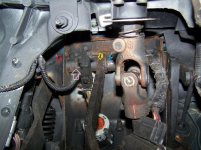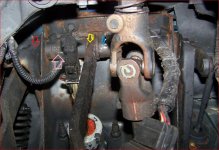I don't know anything about the F250 but I've had problems with sticking calipers in three different cars and each time it turned out to be a brake hose. I'm not sure of the exact failure mechanism, but the inside diameter of the hose would slowly shrink and eventually become completely restricted at the location where they had crimped one of those sheet metal brackets around it that help hold the hose in place. Since the hose has some give to it, it would allow the high pressure brake fluid through to the caliber, but when you would release the brake, the hose would pinch shut and hold a certain amount of pressure inside the caliber. This of course would lead to a lot of overheating and eventual damage.
Since the problem starts out so minor (calibers releasing just a little bit slow) and grows worst at such a slow rate, it's easy to blame the calibers and end up replacing them before finding the real problem (don't ask how I know). If you have a brake hose with this problem, loosening the bracket's grip on the hose a little should allow the brakes to function a lot better for a time. Of course, in this case, it would be wise to replace them ASAP.
I don't often hear of this sort of failure mode so I thought I should mention it. I'm not even sure if the F250 has that sort of brake hose. Maybe I just have bad luck with brake hoses.





